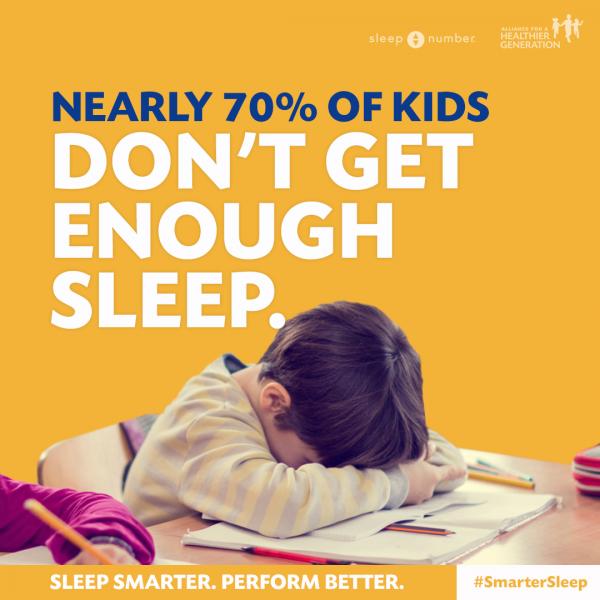December 7, 2018
Does Your School's Start Time Support Healthy Sleep?
Adjusting school start times can help ensure kids get the sleep they need.
Lack of sleep is taking a toll on our kids’ health, safety and academic achievement. They are going through their days running on empty and are not performing at their best in the classroom and on the field.
While the American Academy of Sleep Medicine recommends teens get eight to ten hours of sleep1, data from the Centers for Disease Control and Prevention show that almost 70 percent of them are getting less than seven hours of sleep on school nights2.
Early start times affect the number of hours of sleep students can get each night. How early students have to wake up to get out the door for school is the driving force in what time they get up during the week. It has a significant impact on how much sleep they’re able to get. Delaying school start times can help ensure kids get the sleep they need8.
The Centers of Disease Control & Prevention found that the average start time for schools with grades 6th-12th is 8:03 am, with fewer than 20 percent of all schools starting before the American Academy of Pediatrics’ recommendation of 8:30 am4,5. Ninety-three percent of high schools and 83 percent of middles schools across the country start earlier than that5.
Research shows that students need at least 8 hours of sleep each night. But if they are not hitting the hay before 10:30 pm on school nights, and they have to be out the door by 7:15 am (or earlier) to get to school, that’s less than the minimum hours needed for winding down, getting to sleep, and then getting ready for school in the morning.
While it’s easy to say: “Just go to bed earlier,” it’s important to remember two major factors impacting teens’ ability to just shut it down at night:
- Biology – Circadian rhythms change during puberty. Adolescents biologically prefer later bedtimes.
- Hectic schedules - More homework and extracurricular activities are resulting in busy lifestyles and pushing back bedtimes6,7.
Working together as a school community, you can examine and adjust school day start times can help our kids get at least 8 hours of sleep per night.
Families, administrators and school boards can work together to make sure school start times are allowing students in a community to reach the goal of at least eight hours of sleep per night. For community members coming to the table to help, understanding significant barriers, such as transportation costs, traffic congestion, and scheduling conflicts, is the first step in being part of the solution. Working together as a community, districts can overcome these challenges to ensure their students are performing at their best.
Teachers might see poor performers, administrators might see absent students or troublemakers, families might see broody teens – but all of us, as adults, need to look at the entire picture. Perhaps lack
of sleep is affecting the students in your community more than you realize. Good sleep hygiene combined with later school start times is a win-win for everyone – healthier, happier students who perform better in the classroom, on the field, and in life.
School Leaders:
Does your school day start time promote sufficient sleep and improved health and academic performance? Answer this question now in the Healthy Schools Program Assessment.
Get more tips, resources, and activities to help kids sleep better. Visit the Sleep Smarter. Perform Better. Digital Resource Center.
Sources:
1. http://www.sleepeducation.org/docs/default-document-library/pediatric-sleep-consensus.pdf
2. https://www.cdc.gov/mmwr/volumes/65/wr/mm6513a1.htm
3. https://www.sciencedirect.com/science/article/pii/S0091743511002878
4. https://www.cdc.gov/mmwr/preview/mmwrhtml/mm6430a1.htm?s_cid=mm6430a1_w
5. https://www.cdc.gov/healthyyouth/data/shpps/pdf/shpps-508-final_101315.pdf
6. https://www.cdc.gov/features/school-start-times/index.html
7. Teens and Sleep Back-to-School 2018 Insight Study (GENYOUth survey) https://www.ncbi.nlm.nih.gov/pmc/articles/PMC4824552/#R4
8. American Academy of Sleep Medicine, supported by AAP: https://www.aap.org/en-us/about-the-aap/aap-press-room/pages/American-Academy-of-Pediatrics-Supports-Childhood-Sleep-Guidelines.aspx


